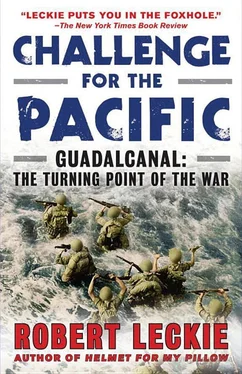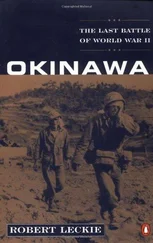But General Marshall and General Arnold were firmly committed to the build-up of the U.S. forces in England—Operation Bolero, as it was called. On May 6, President Roosevelt had told them: “I do not want Bolero slowed down.” They were cool to King’s proposal, even though Cominch backed it up with intelligence reports that the Japanese were moving into Guadalcanal. After much debate, with some reluctance, they agreed.
But who would command?
Marshall wanted General MacArthur and King wanted Admiral Nimitz. It would be a Navy show with the Navy’s Marines, King argued, even though the Solomons did lie within MacArthur’s Southwest Pacific Area. Finally, again after debate, the Solomons were included in the South Pacific Area which Admiral Ghormley was developing under Nimitz’s control.
On June 25 the Joint Chiefs notified Ghormley to confer with MacArthur on the operation.
Next day Ghormley, in Auckland, telephoned General Vandegrift in Wellington.
Wakefield had entered Wellington’s beautiful harbor on a Sunday, June 21. Marines crowding the rails saw a great round of deep blue water girdled by an amphitheater of sloping green hills dotted by white houses with red-tile roofs.
But there was bad news in Wellington.
Lieutenant Colonel William Twining, chief of Vandegrift’s advance party, came aboard with the report that the unloading of the cargo ships which had preceded them was far behind schedule.
“What in hell is wrong?” Vandegrift exploded.
“They work differently from us,” Twining replied. “They stop for morning tea, lunch, afternoon tea. If it’s raining they don’t work at all.” 11
Vandegrift met the impasse with characteristic directness. Heedless of the sensitivities of socialist unions basking in the favor of a Labor Government, he ordered his Marines to form working parties and unload the ships themselves. It was fortunate that he had acted thus and so quickly, for five days later he received Ghormley’s telephone call, and on the next day he and his staff were flying to Auckland.
Vandegrift was astounded when he entered Ghormley’s office. He had known the admiral as a suave and gracious diplomat. But Ghormley appeared harassed. His manner was brusque.
“Vandegrift,” the admiral said, “I have some very disconcerting news.”
“I’m sorry to hear that, Admiral,” the general said.
But the admiral merely handed the general a top-secret dispatch and grunted, “You will be more sorry when you read this.” 12
Archer Vandegrift could not believe what he read. It was the Joint Chiefs’ directive and it specified that the First Marine Division—his, Vandegrift’s—would seize Tulagi and Guadalcanal. They were to land August 1. Five weeks away!
Vandegrift read the dispatch again, slowly, in a tense silence broken by the drumming of Ghormley’s slender fingers on the table.
At last Vandegrift looked up and expostulated: his division was fragmented, one third in Samoa, one third in Wellington, one third at sea; most of his men had not been in uniform six months; most of his equipment was new and needed to be broken in; his supplies would now need to be unloaded, sorted, and combat loaded; he knew nothing of Guadalcanal, not even its location. He concluded:
“I just don’t see how we can land anywhere by August first.”
Ghormley nodded. “I don’t see how we can land at all, and I am going to take it up with MacArthur. Meanwhile, we’ll have to go ahead as best as we can.” 13
Archer Vandegrift began going ahead immediately. He summoned his staff to Ghormley’s headquarters, learning that he would be able to replace the missing Seventh Regiment with the Second Marine Regiment, that he would also have Edson’s Raiders—reclaimed rather than received, he thought dryly—as well as the Third Defense Battalion. These units, of course, were widely scattered: the Second Marines were aboard ship in San Diego, Edson was in Samoa, and the defense unit was in Hawaii. Nevertheless, they could rendezvous at sea. The most pressing matter at the moment, even more so than licking in weeks a logistics problem that normally required months, was to find out something—anything—about Guadalcanal Island.
ON GUADALCANAL the month of June had come to an end in a howling midnight rainstorm. At first light of the first day of July, young Constable Dovu came slogging up the slime-slick trail to Paripao, slipping and catching at bushes to keep his balance, calling out breathlessly:
“Massa, massa! Japan he come along Guadalcanal!”
Clemens burst from his hut, his beard dripping like a blond teardrop, and Dovu rushed on:
“One thousand Japan-man come ashore along Lunga. Gottem big fella machine gun.” Dovu paused for breath, and Clemens cut in sharply.
“Which way you savvy one thousand he stop along Lunga?”
Stung, Dovu explained: “Me sit down along scrub. Catchem ten fella stone along hand, and me countem Japan-man come ashore.” 1
Annoyed, suddenly realizing that the Japanese had probably landed from the cruiser he had seen in the Bay only two days ago, Clemens snapped out an order for Dovu to return to Lunga to observe the Japanese there.
Dovu spun and went sliding down the track, his dark arms outstretched for balance, the mud spurting between his big prehensile toes. He and the other scouts would be back repeatedly within the next week. On July 5, they reported that the Japanese had begun to burn off the tall kunai grass in the plains behind the Lunga coconut groves. Clemens instantly divined that the enemy was building an airfield. He radioed the news to Commander Feldt, unaware that this information, relayed to Washington, had electrified the U.S. Joint Chiefs of Staff.
Meanwhile, Clemens decided to move farther back into the bush. He withdrew to Vungano about halfway across the island. In streaming rain, fording rivers in flood, tightrope-walking over razorbacked ridges, and plastered with mud that worked itself into the eyes and nose and mouth or got into his boots and lay between his toes in coarse cold clots, Clemens plodded dismally along in the track of about a dozen carriers balancing boxed components of his teleradio on their powerful shoulders. Glum though he was, Clemens could at least take consolation from the fact that Sergeant Major Vouza was with him.
Vouza was a real acquisition. He had been in the police service for twenty-five years and had only just retired. He had volunteered to help Clemens. In his forties—close to old age for a Melanesian—Vouza was still a splendid human being, with his broad, deep, muscular torso, his keen, piercing eyes, and a face which shone with loyalty and courage. Clemens put Vouza in charge of all the scouts.
Meanwhile, the Japanese were relieving Clemens of his greatest concern: whether or not the natives would go over to the new masters of the Solomons. Eager to obtain laborers for the new airfield, the Japanese recruited them at bayonet point. They plundered the natives’ vegetable gardens and they strutted. Mr. Ishimoto arrived at Aola Bay and proclaimed himself, in effect, the new District Officer. He had orders typed up and issued in all coastal villages. They said:
JAPANESE OFFICIAL
issued in 16th July, 1942, to inhabitants of Guadalcanal.
Notice No. 1 . All of the inhabitants of this island must be ordered by Japanese Government to co-operate for Japan. Any inhabitants against it should be severely punished by Japanese martial law.
Order No: 2 . Men only of 14 years of old or less than fifty years have to work for Japanese troops at some places on this island. During work for Japanese troops they will be given meals, etcetera.
Gradually, Mr. Ishimoto’s “etcetera”—a euphemism for oppression—solved the native problem. The Japanese became hated. When Ishimoto went patrolling for Martin Clemens during the last few days of July, the natives sent him sloshing down the wrong track. Clemens wisely withdrew deeper into the bush—barefooted this time, to save his remaining pair of tattered boots—achieving the dubious distinction of becoming the first white man to enter the precincts of Vuchikoro, a community of about ten miserable thatched huts perched like a ragged eagle’s nest on the edge of an abyss.
Читать дальше












